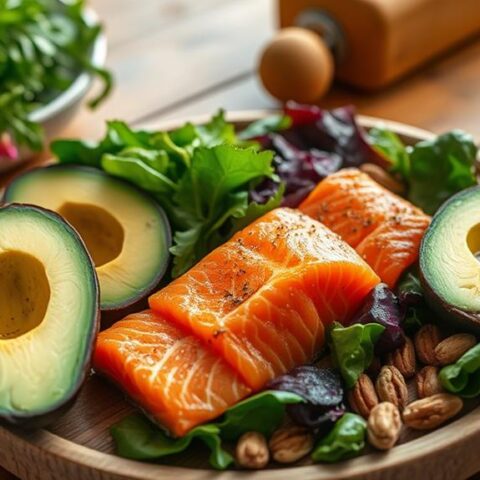
To incorporate pumpkin seeds into a keto-friendly diet, consider their high-fat, moderate-protein, and low-carb composition. With approximately 1.3g of net carbs per ounce, they are ideal as snacks or meal toppings. Add to salads or blend into smoothies for nutritional enhancements. Create keto granola or use ground seeds as a low-carb flour alternative. Opt for portion control, limiting to an ounce to stay within carb limits. Their high fiber, magnesium, and antioxidant properties support digestion and heart health, aligning perfectly with keto goals. Explore various seasoning options to maintain flavor diversity and guarantee dietary satisfaction.
Key Takeaways
- Use pumpkin seeds as a crunchy topping for salads and keto dishes.
- Snack on roasted pumpkin seeds for a low-carb, high-protein snack.
- Blend pumpkin seeds into smoothies for added protein and healthy fats.
- Incorporate pumpkin seeds into homemade keto granola or energy bars.
- Limit portion sizes to 1 oz to stay within keto carb limits.
Understanding Keto and Pumpkin Seeds
Incorporating pumpkin seeds into a ketogenic diet requires a nuanced understanding of their nutritional profile and the principles of ketosis. While pumpkin seeds are not typically considered keto-friendly due to their carbohydrate content of approximately 13.6 grams of net carbs per 100 grams, they do offer significant nutritional benefits that can complement a low-carb lifestyle when consumed mindfully.
Pumpkin seeds are a high protein, low carb snack option, boasting 29.91 grams of protein per 100 grams. This high protein content supports muscle maintenance and growth, both of which are vital on a ketogenic regimen where protein synthesis is essential for muscle repair. Additionally, their total fat content of 40.03 grams per 100 grams supports the high-fat requirement of keto diets, providing a satiating energy source.
However, the challenge lies in their carbohydrate content, accentuated by the fiber which contributes to the net carb count. To maintain ketosis, it is fundamental to manage portion sizes and integrate pumpkin seeds as part of a balanced meal plan.
Consuming them in moderation, perhaps as a topping or a small snack, allows for their inclusion without disrupting ketosis. Consequently, understanding the balance of pumpkin seeds can enhance a keto-friendly lifestyle effectively.
Nutritional Value of Pumpkin Seeds
Pumpkin seeds, or pepitas, offer a remarkable nutritional profile that makes them a valuable addition to various dietary regimens, including the ketogenic diet. Their nutritional breakdown reveals that they are high in energy and essential nutrients. With approximately 559 calories and 49g of total fat per 100g, pumpkin seeds are an excellent source of energy, ideal for those following a keto diet that emphasizes high-fat intake.
Moreover, they provide around 30g of protein per 100g, which is fundamental for muscle building and repair. These seeds are not only great for supporting energy needs but also play a role in maintaining electrolyte balance, which is vital for those adapting to a keto lifestyle.
Aside from being high in fat and protein, pumpkin seeds have a minimal net carbohydrate content of about 4.21g per 100g, fitting well within low-carb dietary constraints. Their nutritional profile is additionally enhanced by their richness in essential minerals, contributing greatly to overall health.
For instance, they contain 8.82mg of iron and 809mg of potassium per 100g. In addition, pumpkin seeds are high in fiber, offering 6.5g per 100g, which supports digestion and gut health.
The following highlights their key nutritional components:
- High-calorie content
- Rich in protein
- Low net carbohydrates
- Abundant essential minerals
- High in fiber
Health Benefits on Keto
Incorporating pumpkin seeds into a ketogenic diet offers several health benefits due to their nutrient density, including essential minerals like magnesium and antioxidants that support overall wellness.
Their high fiber content not only aids in digestive health but also helps maintain a feeling of fullness, which is beneficial for weight management.
Additionally, the healthy fats and magnesium found in pumpkin seeds contribute to heart health by supporting normal blood pressure and reducing inflammation.
The keto diet considerably reduces inflammatory markers, such as C-reactive protein (CRP), which correlates with a decreased risk of coronary artery disease.
Nutrient Density Benefits
For those traversing the nutritional landscape of a ketogenic diet, few foods offer the nutrient density and health benefits of pumpkin seeds.
These seeds are not only nutrient-dense but also align perfectly with the macronutrient profile required for ketogenic success. With approximately 30.23g of protein per 100g, pumpkin seeds serve as a robust source of protein content, supporting muscle maintenance and repair, essential for anyone on a low-carb regimen.
The high content of healthy fats, approximately 49.05g per 100g, guarantees adherence to the high-fat requirements of a ketogenic lifestyle, providing sustained energy and satiety.
Pumpkin seeds are also high in essential minerals, such as magnesium and zinc, which are critical for immune support and metabolic health. Magnesium, at 499.7mg per 100g, plays an important role in over 300 enzyme reactions, while zinc, at 2.9mg per 100g, supports immune function.
Key benefits of pumpkin seeds include:
- High protein content: Supports muscle health and repair.
- Rich in healthy fats: Provides essential energy.
- High in essential minerals: Magnesium and zinc support various bodily functions.
- Antioxidant-rich: Offers protection against oxidative stress.
- Low in net carbs: Suitable for maintaining ketosis.
Digestive Health Support
While the nutrient density of pumpkin seeds greatly enhances the ketogenic diet, their benefits extend beyond macronutrient support to digestive health. A key component of this support is the fiber content in pumpkin seeds, which is approximately 1g per serving. This dietary fiber plays an essential role in digestion by promoting regular bowel movements and alleviating symptoms of constipation, ensuring smoother passage of food through the digestive tract.
Moreover, pumpkin seeds are a substantial source of magnesium, providing around 60% of the daily value per 100g. This mineral is critical for digestive health as it facilitates proper muscle function within the intestines, helping to maintain a healthy digestive rhythm.
Additionally, the zinc content in pumpkin seeds, about 19% of the daily value per 100g, is instrumental in fostering a balanced gut microbiome. Zinc promotes the growth and maintenance of beneficial gut bacteria, which is crucial for digestion and overall gastrointestinal well-being.
The antioxidant properties of pumpkin seeds further contribute to digestive health by minimizing gut inflammation. This can be particularly beneficial for individuals with digestive disorders, potentially reducing discomfort and enhancing overall gut function.
Integrating pumpkin seeds into a keto diet can therefore support thorough digestive health.
Heart Health Advantages
Often overlooked, pumpkin seeds offer remarkable cardiovascular benefits, making them an excellent addition to a ketogenic diet focused on heart health. These seeds, a powerhouse of nutritional benefits, are rich in magnesium, which plays a significant role in regulating blood pressure and promoting better circulation. This mineral is essential for individuals on a keto-friendly regimen who aim to maintain peak heart health.
The antioxidant content in pumpkin seeds, particularly vitamin E, is instrumental in protecting heart cells from oxidative stress and inflammation, thereby reducing the risk of heart disease. Additionally, the consumption of these seeds contributes to a healthier lipid profile by lowering LDL cholesterol levels while boosting HDL cholesterol.
Furthermore, the omega-6 fatty acids present in pumpkin seeds can enhance cardiovascular health by reducing blood clotting and supporting healthy blood vessels when balanced with omega-3 intake. Regular inclusion of pumpkin seeds in one's diet also guarantees the intake of essential minerals like zinc and iron, which are critical for maintaining a robust circulatory system.
- Rich in magnesium: Supports blood pressure regulation and circulation.
- High in antioxidants: Protects against oxidative stress and inflammation.
- Improves cholesterol levels: Lowers LDL and increases HDL.
- Contains omega-6 fatty acids: Promotes blood vessel health.
- Nutrient-dense: Provides zinc and iron for circulatory health.
Portion Control Tips
Managing portion sizes is vital when incorporating pumpkin seeds into a keto diet, as it helps maintain the delicate balance of macronutrients required for ketosis. Understanding the importance of macros is significant for effective diet management.
Adhering to portion control tips can guarantee that pumpkin seeds remain a keto-friendly option. A recommended serving size is 1 oz (approximately 28 grams), which contains about 1.3 grams of net carbohydrates. This amount can be easily accommodated within the daily carb limit typical of a ketogenic diet. To monitor daily intake effectively, consider integrating pumpkin seeds into meals or snacks, making sure they do not comprise more than 10% of your total daily carbohydrate allowance.
To achieve an accurate portion, utilize measuring cups or a kitchen scale, which can prevent unintentional overeating. This practice is significant for maintaining ketosis, as exceeding carb limits could disrupt the metabolic state.
For balanced snacking, mix pumpkin seeds with other low-carb ingredients like nuts or seeds, keeping overall portions in check.
Furthermore, maintaining a food diary can provide valuable insights into pumpkin seed consumption and its effect on daily carb intake. This practice supports adherence to keto goals and assists in maintaining the required macronutrient balance for effective ketosis.
Creative Recipe Ideas
Incorporating pumpkin seeds into your culinary repertoire offers a versatile and nutrient-rich way to enhance keto-friendly meals.
These seeds are an excellent addition to low-carb recipes, providing significant nutritional benefits such as healthy fats and protein. They are low in carbs, offering only about 5 grams per ounce, making them ideal for maintaining ketosis. Additionally, pumpkin seeds are an excellent source of magnesium and zinc, vital minerals for overall health.
To inspire your next culinary endeavor, consider these creative recipe ideas that utilize pumpkin seeds as a central ingredient:
- Salad Enhancer: Add roasted pumpkin seeds to keto-friendly salads for an extra crunch, contributing 15g of fat per ¼ cup serving.
- Smoothie Booster: Blend pumpkin seeds into smoothies to enhance texture and nutrition, delivering 8g of protein and 3g of net carbs per serving.
- Flour Substitute: Use ground pumpkin seeds as a flour substitute in baking recipes, enhancing flavor while maintaining a low-carb profile.
- Homemade Granola Bars: Mix pumpkin seeds with almond butter and low-carb sweeteners to create delicious granola bars.
- Energy Balls: Incorporate pumpkin seeds into energy balls with cocoa powder and unsweetened coconut, offering a nutrient-dense treat with approximately 3g of net carbs per serving.
Snack and Meal Suggestions
Enhance your keto meal planning by integrating pumpkin seeds into your snack and meal repertoire, taking advantage of their nutritional profile that supports a low-carb lifestyle.
As a crunchy snack, roasted pumpkin seeds offer a satisfying option with 8g of protein and a mere 3g of net carbs per ¼ cup serving, making them an ideal keto-friendly treat. Not only are pumpkin seeds rich in protein, but they also contain healthy fats and essential minerals.
Their nutrient density doesn't stop at snacking; consider incorporating pumpkin seeds into salads. This addition not only improves texture but also supplies essential minerals like magnesium and zinc, vital for overall health maintenance while adhering to a low-carb regimen.
For those seeking a nutritional enhancement in beverages, adding pumpkin seeds to smoothies provides healthy fats compatible with a ketogenic diet, while maintaining minimal net carbs.
In baking, ground pumpkin seeds can serve as a flour substitute, infusing recipes with a nutty flavor and a substantial protein content of 29.91g per 100 grams.
Additionally, mixing pumpkin seeds into homemade granola or energy bars creates a satisfying snack that aligns with keto principles, ensuring low carbohydrate content while delivering high healthy fats.
These practical applications of pumpkin seeds demonstrate their versatility and compatibility with keto-friendly diets.
Flavor Variations to Try
Exploring various flavor profiles can improve the versatility of pumpkin seeds in a keto diet, offering options that cater to both sweet and savory preferences.
For a spicy touch, a combination of cayenne pepper and chili powder can provide an invigorating flavor with minimal carbs.
Additionally, herb-infused mixes using dried rosemary, thyme, and oregano can enhance the seeds' taste, making them a delightful addition to salads or cheese platters.
Spicy Seasoning Options
For keto enthusiasts looking to spice up their pumpkin seed snacks, a variety of seasoning options offer both flavor and dietary compatibility. Experimenting with a spicy seasoning blend provides a zesty flavor profile that enhances roasted pumpkin seeds. A popular choice is mixing 1 tablespoon of chili powder, 1 teaspoon of cayenne pepper, and 1 teaspoon of garlic powder. This combination delivers a robust and fiery taste that aligns perfectly with a keto diet.
For those who enjoy a smoky twist, smoked paprika can be combined with cumin and sea salt, which not only highlights the natural nuttiness of the seeds but also adds depth to their flavor.
Here are several spicy seasoning ideas to try:
- Spicy Seasoning Blend: Chili powder, cayenne pepper, garlic powder
- Smoky Paprika Mix: Smoked paprika, cumin, sea salt
- Everything Bagel Seasoning: Sesame seeds, poppy seeds, garlic powder, onion powder, salt
- Sweet and Spicy Mix: Pumpkin pie spice, cayenne pepper (note: use sparingly for sweetness)
- Tangy Chili Lime: Lime juice, chili powder
These seasoning options not only provide a variety of flavor profiles but also maintain the keto-friendly nature of roasted pumpkin seeds, ensuring a satisfying and nutritious snack.
Sweet and Savory Mixes
Pumpkin seeds offer a versatile base for both sweet and savory flavor combinations, making them an ideal component of a keto diet. These seeds can be transformed into a keto-friendly, low-carb treat by combining roasted seeds with cinnamon, a pinch of stevia or erythritol, and unsweetened cocoa powder. This creates a satisfying sweet snack that caters to your sweet tooth without deviating from your dietary goals.
For those who prefer savory snacks, roasted pumpkin seeds can be tossed with garlic powder, smoked paprika, and nutritional yeast. This blend offers a rich, umami flavor that enhances your keto meals, making it a perfect addition to salads or as a standalone snack.
Additionally, experimenting with spice blends like everything bagel seasoning or taco seasoning can add diverse, exciting flavors while keeping your snacks keto-friendly.
Moreover, for a more complex snack, consider creating a trail mix by combining pumpkin seeds with unsweetened coconut flakes and chopped nuts. This mix is not only low in carbs but also high in healthy fats, providing sustained energy and satiety.
These versatile flavor variations guarantee that pumpkin seeds remain a staple in your keto-friendly diet.
Herb-Infused Variations
While pumpkin seeds are already a nutritious addition to a keto diet, infusing them with herbs can enhance their flavor profile and nutritional value.
Herb-infused variations bring a savory twist that raises the natural nuttiness of pumpkin seeds, making them a versatile and delightful component of any meal. With their rich content of healthy fats, these seeds can be transformed into a range of culinary experiences.
Consider these herb-infused flavor variations:
- Garlic Powder, Rosemary, and Thyme: This classic combination adds a savory twist, perfect for snacking.
- Dried Basil, Oregano, and Crushed Red Pepper: A Mediterranean-inspired blend that pairs excellently with salads or as a soup topping.
- Lemon Zest and Dill: Offers a zesty kick, enhancing the nutritional profile while providing a revitalizing contrast.
- Smoked Paprika and Cumin: Imparts a smoky flavor, ideal for charcuterie boards or as a stand-alone snack.
- Dill, Onion Powder, and Chives: Evokes the essence of a classic herb dip, great with low-carb vegetables.
Incorporating these variations not only diversifies your diet but also guarantees that you enjoy the many health benefits of pumpkin seeds, such as their high content of healthy fats and essential nutrients.
Storage and Preservation Tips
Storing roasted pumpkin seeds properly is essential to maintaining their freshness and nutritional value. To achieve this, it is vital to use an airtight container or a sealed bag. This method of storage helps prevent moisture absorption, which can compromise the seeds' quality.
Keeping pumpkin seeds in a cool, dark place is another effective strategy to preserve their crunchiness and safeguard them from light exposure, which can degrade their overall quality. Light and heat can accelerate the process of rancidity, where the natural oils in the seeds break down, affecting both flavor and safety.
For ideal storage duration, roasted pumpkin seeds can be kept at room temperature for about 1-2 weeks. If you wish to extend their freshness, refrigeration is recommended, as it can prolong their usability to several months. However, regularly monitor the seeds for signs of rancidity, as the oils can still deteriorate over time.
To enjoy the full texture and flavor of pumpkin seeds, it is advisable to consume them within a few weeks of roasting. By following these practical storage tips, you can maximize the nutritional benefits and enjoyment of pumpkin seeds in your keto-friendly diet.
Potential Side Effects
Proper storage of pumpkin seeds guarantees their freshness, but it's equally important to be aware of potential side effects associated with their consumption. When integrating pumpkin seeds into a keto-friendly diet, moderation is essential to avoid unintended consequences.
Overconsumption of pumpkin seeds can lead to exceeding daily carbohydrate limits, disrupting ketosis for those adhering to a strict keto regimen. Additionally, their high caloric content may contribute to weight gain if not consumed judiciously. Staying hydrated and maintaining electrolyte balance can help alleviate some common keto side effects like headaches and fatigue, which can be exacerbated by dietary changes.
Potential side effects include:
- Gastrointestinal discomfort: Consuming large quantities can cause bloating or gas due to their fiber content.
- Allergic reactions: Although rare, some individuals may experience adverse symptoms after consuming pumpkin seeds, necessitating careful monitoring.
- Omega-6 fatty acids: High intake can lead to an imbalance in the omega-6 to omega-3 ratio, which may impact overall health negatively.
- Exceeding calorie intake: With 559 calories per 100 grams, pumpkin seeds can quickly add up in calories, requiring moderation to maintain weight goals.
- Ketosis disruption: Exceeding carbohydrate limits due to overconsumption may knock individuals out of ketosis, hindering diet goals.
Frequently Asked Questions
How Many Pumpkin Seeds Can I Eat on Keto?
For a keto diet, limit pumpkin seeds to 1 ounce daily to manage carb intake effectively. This serving provides a nutritious snack option, rich in beneficial nutrients. Explore keto-friendly recipes and portion control tips to maximize health benefits.
How Do I Incorporate Pumpkin Seeds Into My Diet?
Incorporating pumpkin seeds into your diet can enhance nutritional intake. Their nutrient profile offers benefits like protein and healthy fats. Consider keto snack ideas and pumpkin seed recipes, but maintain portion control to optimize health benefits.
Should You Grind Pumpkin Seeds Before Eating?
Grinding pumpkin seeds is recommended to enhance nutrient absorption and digestion support. This method improves their bioavailability, offering health benefits. Ground seeds can also enhance flavor in various cooking methods, providing a practical approach to dietary incorporation.
Should Pumpkin Seeds Be Soaked Before Eating?
Soaking pumpkin seeds promotes digestive health and enhances flavor by removing enzyme inhibitors and phytic acid. This soaking method also boosts nutritional benefits and bioavailability. For best results, rinse thoroughly and store seeds in a cool, dry place.
Conclusion
Incorporating pumpkin seeds into a keto-friendly diet offers numerous nutritional benefits, including essential minerals, healthy fats, and a high protein content. Their health advantages align well with ketogenic dietary goals, provided portion control is maintained. Diverse culinary applications, from snacks to meals, enhance dietary variety while flavor variations provide additional enjoyment. Proper storage guarantees freshness, although awareness of potential side effects is necessary for ideal health outcomes. Overall, pumpkin seeds present a versatile and nutritious addition to a keto regimen.









No Comments